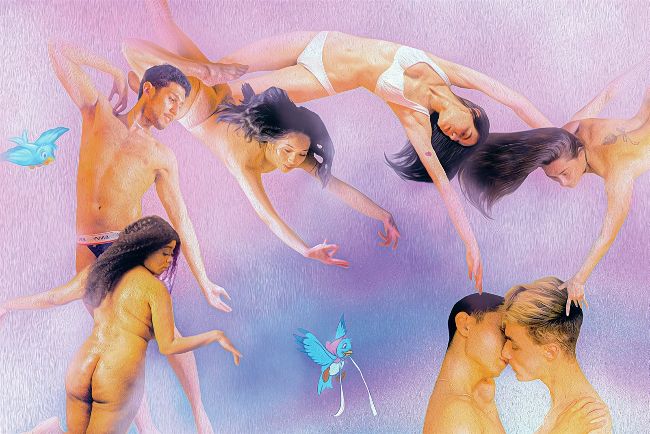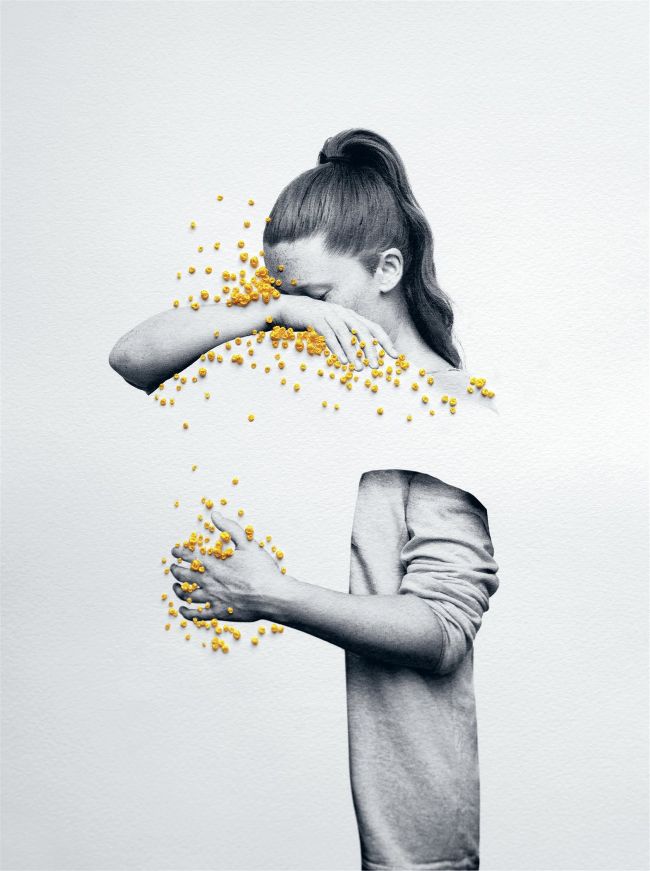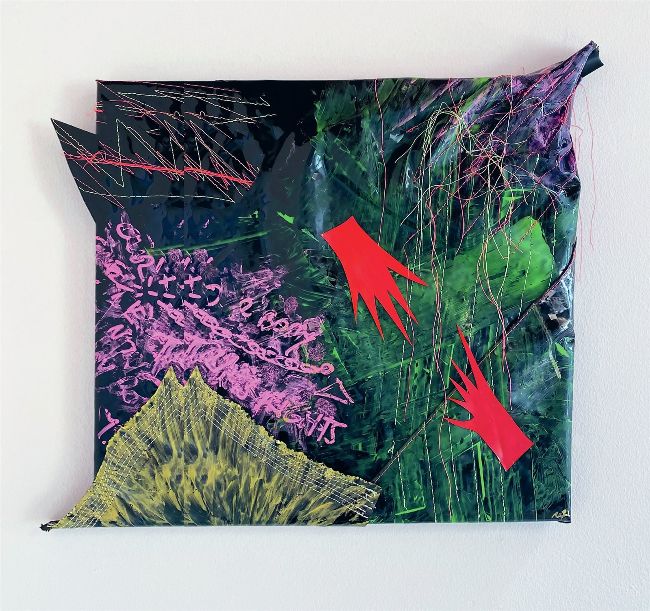Feature Eight artists – Eight moments – Inspiration
The Art of Reflection
Throughout the centuries, artists have responded to their culture, their times, capturing feelings, the mood of the nation. The queer community know only too well the power of slogans and images during the years we couldn’t be out, the years when the odds were stacked against us.
For some, those landmark moments for the community are immediately remembered with a photograph, an illustration, an artwork.
This Pride, we tasked artists with creating new works inspired by landmark moments for our LGBTQ+ family. Their challenge was to capture with one image our journey, our successes, our battles. GCN is proud to present their stunning achievements and to take this time to remember how far we’ve come and what it took to get us here.
1. Declan Flynn
In September 1982, Declan Flynn was murdered by a group of young men looking to rid Fairview Park of “steamers”.
His killing and the subsequent trial where his killers were acquitted became the catalyst for the modern gay rights movement.
BRIAN TEELING
‘Declan Flynn in Dublin’
“The Face That Never Changes Yields a Feeling That Never Changes.”
I can’t remember exactly where the above quote is from, I think it might have been from Olivia Laing talking about the artist David Wojnarowicz.
The difficulty with making work about Declan is that he has only ever been portrayed totemically, as that ‘face that never changes’. But beneath this mask, there was a person that lived in Dublin. Who was part of the LGBTQ+ community, a man who was dedicated to his family.
Declan’s murder is often misunderstood as the origin of Pride in Ireland. It wasn’t, however it did serve as a catalyst for protest. When we think of Declan in emblematic terms only we lose the person who he was along the way.
I’ve learned a lot about him following this commission. When I spoke with his brother Paul, I learned of Declan’s love of Elvis, Christmas in Dublin and his love for his brother Greg. How he would go to see Where Eagles Dare and Tora! Tora! Tora! repeatedly in the Casino cinema in Finglas. And how he was a quiet, shy man.
When I spoke with Tonie Walsh I learned about Declan’s association with the community, with him working the cloak room of Flikkers at The Hirschfield Centre - which obviously influenced his love of disco and gave him a sense of place in our community. And also, how he was a quiet, shy man.
‘Declan Flynn in Dublin’ therefore, is what I wanted to portray about Declan in the present day. His absence.
Instagram: @brianteeling
2. The First Pride
In June 1983, galvanised by the Fairview March, the LGBTQ+ community made their way from Fusilier’s Arch in Dublin to the GPO in what is widely regarded as the first Pride march.
GABRIEL MARQUES
I decided to pay homage to Declan Flynn since his brutal murder was a big reason for the protest in that year. The nature around him in the image represents Fairview Park, plus the green carnation (a reference to Oscar Wilde and the subtle hint of a man who loves another man), and the GPO at the bottom to symbolise where the rally happened.
I also added a few design details like the pink ribbon in the bottom that was the same colour as the event’s original flyer, and also took some meaningful words from newspaper articles from back in the day.
The rainbow flag was mandatory, so I had him holding it to symbolise Pride and express the movement. His chest is out to show his heart and how fragile we can feel sometimes. I tried to reference his face from pictures I found online, it’s not exactly like him but it’s more a representation of who he was -a peaceful and beautiful image related to his name. I added the white doves for peace and placed them around him to represent the friends and family that loved him, and the people who supported him at that Pride event.
Instagram: @mr_gabrielmarques
3. The AIDS crisis in Ireland
Almost 40 years since the first AIDS case was diagnosed in Ireland in 1982, the legacy of the crisis still casts a long shadow on the community. Despite medical advances, stigma remains the largest factor in the battle against no new diagnoses of HIV.
CAIO FABRO
Instagram: @caeiou / fabrocaio@gmail.com
AIDS is a very painful, heavy and sad subject in queer history. My concept to create an artwork to represent the crisis was not to forget the terrifying early days, but also to highlight the moments of victory and how the community fought for their rights. Using my abstract and geometric art, I tried to encapsulate all those important moments of history in the form of a temple where I could tell a story through a timeline; the discovery of the virus, the lives that have been lost, the grief, the love and the fight of the community to end the stigma, the activism, and the methods of prevention available to protect us.
“Wow, it was a criminal offense to be gay in Ireland before 1993.”
4. Decriminalisation
Following a lengthy struggle by Senator David Norris and the Campaign for Homosexual Law Reform amongst others, homosexuality was decriminalised in Ireland with the passing of the second phase of the bill to decriminalise sexual acts between consenting adults.
NEASA TIERNEY
‘The Road to Decriminalisation 1993’
I wanted to portray the impact of 1993 on today’s generation. How it was shocking that it was a “criminal offence” to be gay in Ireland before 1993. The illustration depicts two youths looking at key moments in LGBTQ+ Irish history. The first image in the gallery is the Fairview March in response to the killing of Declan Flynn (19 March 1983) and the second is 1993’s Pride March. The two youths are painted with vibrant colours to represent the freedom 1993 brought to today’s queer population in Ireland.
Instagram: @neasa_tierney
5. Gender Recognition
In July, 2015, the Irish Government passed the Gender Recognition Act, which sees Ireland become the fourth country in the world to specifically introduce legislation based on self-determination, removing all medical criteria from the legal recognition process for those over 18.
THE STAIRLINGS
Firstly we would like to highlight that this piece would not have been possible without the ongoing support and encouragement we receive from Sara R Phillips and the incredible work she does collecting and archiving The Irish Trans Archive. Secondly, this piece represents only a fraction of the individuals and the time dedicated to bringing the Gender Recognition Act into fruition and we would like to say thank you to all of those who gave their time, shared their stories and took those risks to make it possible for others to live their lives.
In this piece we have two opposing pictures of Lydia Foy, in the coloured photo she has just won her case (2015) and the obvious euphoria of this win was essential for us to include. In a prior case in 2002, which she lost, we can see the impact of this on Lydia as she faced the intense glare of the media. Self identification is an important and necessary step for trans people, it should not be limited to those of us over 18. We would like to take this time to make it clear that this is not the end. There is a long way to go for our community to be truly equal. Non-binary, intersex and those under the age of 16 are still not cared for by the Gender Recognition Act. And beyond that we need proper informed consent healthcare in the community and an end to the pathologising model practiced in the national gender service currently.
Instagram: @thestairlingscollective

Instagram: @stevenpeice
6. Marriage Equality (full image on cover)
After hard fought battles, May 22nd, 2015, saw Ireland hold a referendum to amend the constitution to legalise same-sex marriage. 62.07 percent of the population vote in favour.
STEVEN PEICE
The day of Marriage Equality was the day after my birthday. I remember on the day seeing a double rainbow – this reminded me to count my blessings that I live in a country where something like this is possible. I’m originally from Mongolia –a country where you don’t have that opportunity.
To create this image I put a call out for models of all different shapes and sizes. Over five days I took 22 different portraits using the same reference. I’d planned it out so much I could tell each model where I was going to put them in the frame. They all had faith in the idea. 90 percent of them I’d never even met before, and they were still willing to jump up and down 65 times in a row! The 23 people represent the results of the referendum coming out on May 23.
I feel so proud that so many queer people are open to creativity, love and friendship. Every year, at Pride, I thank god that I’m gay.

Instagram: @hazelcoonagh
7. Repealing the Eighth Amendment
After many hard-fought years, a 2018 referendum on the legality of abortion passed by 67 percent to 33, removing the Eighth Amendment from the Irish Constitution.
HAZEL COONAGH
‘Together’
The day the results for Repeal the Eighth came in, I excitedly got myself together and headed into town. The sun shone on scores of smiling women who lined the streets and sat outside cafes and bars celebrating the good news. I got to the entrance of Dublin Castle just as the Repeal angels arrived, dressed in full white wings and robes, to thunderous applause and joyful crowds. The atmosphere was incredible.
I then walked on to the Savita Halappanavar mural across town. Here, people stood silently, laid flowers and wrote notes of condolence and commemoration. I noticed a woman standing next to me was crying. I placed my hand on her shoulder and she threw her arms around me and we hugged and cried together. It was a highly cathartic moment filled with a mix of emotion after a long and difficult campaign. I will always remember her for helping to give me that moment of release, and I’m so glad I could be there for her too.
Together, women draw so much strength from one another. Our solidarity and combined strength and fight will continue to get us through anything.

Instagram: @markmolloy_
8. Northern Ireland Bill
On July 22, 2019, landmark legislation on abortion rights and equal marriage in Northern Ireland passed the final stage in the UK Parliament, becoming law.
MARK MOLLOY
‘Ours’
As queer people, the majority of us had to configure our identity growing up in fear of rejection or prejudice. So my work is an exploration of that energy but using it as a means to celebrate rather than conceal.
For this work, I was inspired by the murals found throughout Northern Ireland featuring imagery of conflict and war alongside national identity.
I featured some handwritten text of words that have been used in chants at political demonstrations such as in the campaign to Repeal the Eighth.
These words of protest are smeared and smudged by fingerprints, only to be written over again though. Not perfect but history nonetheless.
I aimed for a feeling of movement in this work. Clashes and chaos. I wanted the canvas to look ugly in a sense. So much energy that no area of the work is really finished - everything is interrupted and misshapen. Paths being destroyed and then picked up again and rewritten.
Erratic rows of stitching, in the top left corner, coloured green and orange reference the Irish flag with pink threads running alongside them as a symbol for queerness.
The red hands are a reference to the Red Hand of Ulster, reaching out to each other - one coming from the north and the other from the south. The gold burst is a symbol of celebration and victory.